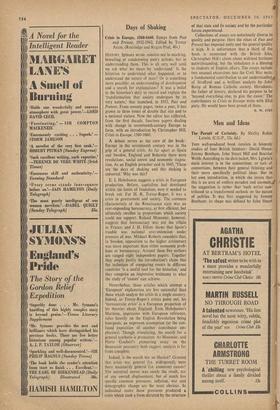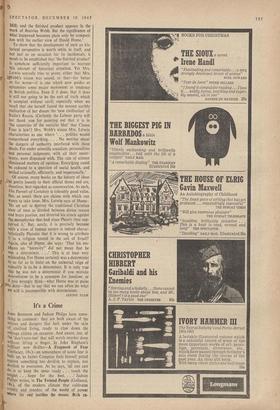Men and Ideas
The Pursuit of Certainty. By Shirley Robin Letwin. (C.U.P., 52s. 6d.) THIS well-produced book consists in leisurely studies of four British thinkers: David Hume, Jeremy Bentham, John Stuart Mill and Beatrice Webb. According to the dust-jacket, Mrs. Litwin's main interest is in the connections, or lack of connections, between their general thinking and their more specifically political ideas. But in her own introduction, in which she insists that this is an area of endless paradox and anomaly,4 the suggestion is rather that 'each writer con- tributed to a transformed outlook on the nature of politics. It was first suggested by Jeremy Bentham; its shape was defined by John Stuart
Mill; and the finished product appears in the work of Beatrice Webb. But the significance of what happened becomes plain only by compari- son with the earlier view of David Hume.'
To show that the development of such an his- torical perspective is worth while in itself, and not just as an occasion for its incidentals, it needs to be established that 'the finished product' is somehow sufficiently important to warrant this amount of historical attention. Yet Mrs. Letwin scarcely tries to prove, either that Mrs. ',Webb's vision was sound, or that—for better or for worse—it is one which now guides or epitomises some major movement or tendency in British politics. Even if it does, that it does is still not going to be the sort of truth which is accepted without cavil; especially when we recall that she herself found the nearest earthly realisation of her dream the 'new civilisation' of Stalin's Russia. (Certainly the Labour party will not thank you for pointing out that it is in `the countries of the socialist bloc' that Clause. Four is law 1) Mrs. Webb's vision Mrs. Letwin
characterises as one where . . politics would comprehend everything. . . . No worries about the dangers of authority interfered with these Ideals. For under scientific socialism, personalities and personal judgments, with all their uncer- tainty, were dispensed with. The rule of science eliminated matters of opinion. Everything could be reduced to a question of social health, and settled rationally, efficiently, and impersonally.'
Of course, many books on the history of ideas "''‘‘It pretty loosely to their official theses and are, therefore, best regarded as conversation. As such, 'he Pursuit of Certainty is tolerably good value. But, as usual, there are claims with which one wants to take issue. Mrs. Letwin says of Hume: `1-le set out to destroy the traditional Christian view of man as divided between divine reason and brute passion, and directed his attack against the metaphysics that had since Plato's time sup- Ported it.' But, surely, it is precisely because such a view of human nature is indeed charac- teristically Platonic that it is wrong to attribute it to a religion rooted in the soil of Israel? Again, also of Hume, she says: 'That his em- phasis on "necessity" did not mean that he Was a determinist. . . .' This is at least very misleading. For Hume certainly was a determinist in so far as to insist on the universal reign of causality is to be a determinist. It is only true that he was not a determinist if you mistake d. eterminism to be a synonym for fatalism; or if you wrongly think—what Hume was at pains Mc deny—that to say that we can often do what we will is incompatible with determinism.
ANTONY FLEW







































 Previous page
Previous page